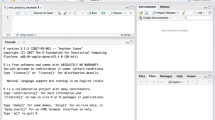Abstract
In this work, we present methods, stemming from particular three-way data analysis methods, to tackle two specific problems arising when analysing open-ended answers in surveys. The first problem consists in the comparison of the answers given to a same question in different surveys; the second one is the study of the set of categories or individuals as described by their answers to several open questions. Specific software routines have been devised.
Access this chapter
Tax calculation will be finalised at checkout
Purchases are for personal use only
Preview
Unable to display preview. Download preview PDF.
Similar content being viewed by others
References
Abdessemed, L. Escofier, B. (1996). Analyse factorielle multiple de tableaux de fréquences; comparaison avec l’analyse canonique des correspondances, Journal de la Société de Statistique de Paris, tome 137, n°2, 3–18.
Bry, X. (1996). Analyses factorielles multiples, Economica, Paris.
Carlier, A., Lavit, C., Pagès, M., Pemin, M.O., Turlot, J.-C. (1988). A comparative review of methods which handles a set of indexed data tables, in: Multiway Data Analysis, Coppi R., Bolasco S. (Eds), North Holland, Amsterdam, 85–102.
Carlier, A., Ewing, G. (1992). Longitudinal Analysis of Contingency Tables with Application to Demographic Data, Computational Statistics, 7, 329- 353.
Carlier, A., Kroonenberg, P. M. (1996). Descompositions and biplots in three-way correspondence analysis, Psychometrika, 61,2, 355–373.
Escofier, B (1987). Analysis and Comparison of Different Tables, Recent Developments in Clustering and Data Analysis, Débats du Séminaire scientifique franco-japonais, 307–322.
Escofier, B., Pagès, J. (1993). Analyses factorielles simples et multiples; objectifs, méthodes et interprétation, Dunod, Paris.
Kiers, H. A. L. (1989). Three-way methods for the Analysis of Quantitative and Qualitative Two-way Data, DSWO Press, Leiden. Lebart, L. (1987). Conditions de vie et aspirations des français, évolution et structure des opinions de 1978 à 1986, Futuribles, septembre 1987, 25–56.
Lebart, L., Salem, A., Berry E. (1997). Exploring textual data, Kluwer, Dorfrecht.
Salem, A. (1995). Les unités lexicométriques in: Analisi Statistica dei Dati Testuali, Bolasco et al. (Eds.), CISU, Roma, 19–26.
van der Heijden, P. G. M. (1987). Correspondence Analysis of Longitudinal Categorical Data, DWSO Press, Leiden.
Author information
Authors and Affiliations
Editor information
Editors and Affiliations
Rights and permissions
Copyright information
© 1998 Springer-Verlag Berlin · Heidelberg
About this paper
Cite this paper
Bécue-Bertaut, M. (1998). Three-way textual data analysis. In: Rizzi, A., Vichi, M., Bock, HH. (eds) Advances in Data Science and Classification. Studies in Classification, Data Analysis, and Knowledge Organization. Springer, Berlin, Heidelberg. https://doi.org/10.1007/978-3-642-72253-0_62
Download citation
DOI: https://doi.org/10.1007/978-3-642-72253-0_62
Publisher Name: Springer, Berlin, Heidelberg
Print ISBN: 978-3-540-64641-9
Online ISBN: 978-3-642-72253-0
eBook Packages: Springer Book Archive




